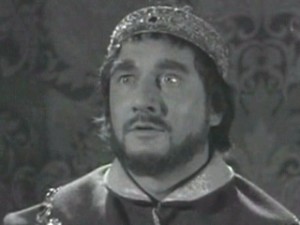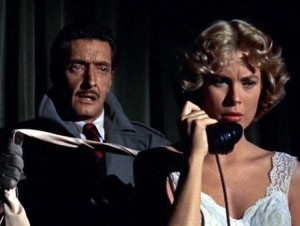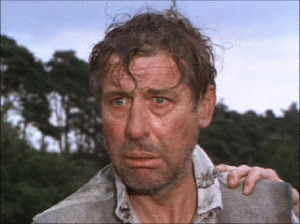 As in the case of one special surprise. All though one episode, “The Prisoner,” this one actor’s voice sounded familiar. But beneath the hat and beard, he was a nonentity to me. I think it was mainly the presence of hair that confused me. Perhaps, if he had been bald—and in a Nazi uniform—— In the coming years I would relish him in that kind of role—in The Eagle Has Landed, The Night of the Generals, The Treasure of the Amazon and River of Death. But he was also Adrian Carsini in a Peter Falk Columbo, the preacher Quint in Will Penny, Professor Fowler in the “Changing of the Guard” episode of the original Twilight Zone and—Colin Blythe in The Great Escape. Yes, Donald Pleasence. And he was Prince John in four installments of Robin Hood.
As in the case of one special surprise. All though one episode, “The Prisoner,” this one actor’s voice sounded familiar. But beneath the hat and beard, he was a nonentity to me. I think it was mainly the presence of hair that confused me. Perhaps, if he had been bald—and in a Nazi uniform—— In the coming years I would relish him in that kind of role—in The Eagle Has Landed, The Night of the Generals, The Treasure of the Amazon and River of Death. But he was also Adrian Carsini in a Peter Falk Columbo, the preacher Quint in Will Penny, Professor Fowler in the “Changing of the Guard” episode of the original Twilight Zone and—Colin Blythe in The Great Escape. Yes, Donald Pleasence. And he was Prince John in four installments of Robin Hood.
To illustrate how one role could be played by more than one actor, take that of a seneschal, a household official of a noble. Martin Lane, whose entire career encompassed two TV series and one film, played the part twice. While Patrick Troughton also played a seneschal twice, he is better remembered for The Omen as the cancer-riddled priest who warned Gregory Peck of the hellish origins of his son and was impaled on a plummeting flag pole during an electrical storm. Both Lane and Troughton appeared in a number of other Robin Hood episodes as spy, traveler, sheriff’s lieutenant, inn customer, even rising socially to royalty. Troughton had another distinction during his forty-year career: he played Robin in an earlier, now lost TV series.
Leo McKern, who ties in with The Omen as the character who advised Peck on how to kill his evil son, was in the first two installments of Robin Hood, both in well-born parts. McKern is best remembered as the title character in BBC’s Rumpole of the Bailey, which ran 1978-1992. Ian Hunter, who was King Richard in the definitive Robin Hood flick in 1938—the one with Errol Flynn, of course—was Sir Richard of Lea in seven episodes.
 Ronald Howard, the son of Leslie Howard, appeared twice as one of many actors who played Will Scarlet, although his main claim to fame—brief, only one season—was as Sherlock Holmes in that 1950s series. He was usually outclassed, however, by a better than average Dr. Watson, played by Howard Marion-Crawford, whose role as a medical doctor, in zany moviedom logic, automatically qualified him for subsequent doctor roles.
Ronald Howard, the son of Leslie Howard, appeared twice as one of many actors who played Will Scarlet, although his main claim to fame—brief, only one season—was as Sherlock Holmes in that 1950s series. He was usually outclassed, however, by a better than average Dr. Watson, played by Howard Marion-Crawford, whose role as a medical doctor, in zany moviedom logic, automatically qualified him for subsequent doctor roles.
Incidentally, the actor who most frequently played Will Scarlet in the series was Paul Eddington, later of BBC’s Good Neighbors and Yes, Prime Minister. Jill Esmond played Queen Eleanor in two episodes, the last of her rather limited screen appearances. She was the first wife of Laurence Olivier.
Small world! Speaking of the BBC—and it’s hard to get away from things British in the British-made Robin Hood—Charles Lloyd-Pack, with five episodes to his credit, was the father of Roger Lloyd-Pack, who has become a staple in much current British TV, from single episodes of Inspector Morse and Doc Martin to, most famously, a permanent resident in the irreverent The Vicar of Dibley. He is perhaps better known to youngsters as Bartemius “Barty” Crouch in Harry Potter and the Goblet of Fire.
 Anthony Dawon. Remember him? He was the would-be murderer of Grace Kelly in Dial M for Murder. He ended up being killed himself by his intended victim with a pair of scissors. Dawson made only one Robin Hood appearance, in the second season’s “Blackmail.” As Lucas, hiding in a wine cart, he discovered Maid Marian in Robin’s camp, and his mismanaged attempt at extortion precipitated his quick end—run through by the sheriff.
Anthony Dawon. Remember him? He was the would-be murderer of Grace Kelly in Dial M for Murder. He ended up being killed himself by his intended victim with a pair of scissors. Dawson made only one Robin Hood appearance, in the second season’s “Blackmail.” As Lucas, hiding in a wine cart, he discovered Maid Marian in Robin’s camp, and his mismanaged attempt at extortion precipitated his quick end—run through by the sheriff.
This episode contained the touches of humor that brightened much of the series. When Robin suggested the friar employ a little abstinence and lay off the wine needed for that oncoming cold, Tuck protested. “Abstinence?! There’s a time and place for everything.” Another segment, “The Intruders,” was played entirely for its humor. Maid Marian joined Robin in a ruse to discourage two youths (Michael McKeag and Ian Whittaker) from a life of crime. Robin, masquerading as a thief and killer, led Jules and Godric in a supposed break-in of the lady’s bedchamber. He suggested the three roll dice to see who would kill her. Both youths fled in a panic. It was in this episode that Victor Woolf turned up as a traveler.
Followers of John Cleese’s Fawlty Towers will know Ballard Berkeley as the blasé, befuddled Major Gowan, my favorite resident of Basil’s disaster of a hotel, made more so by its owner’s demented asininity. Berkeley’s best moment came in the episode “The Germans.” Viewers of Robin Hood probably wouldn’t recognize him as Count De Waldern in one of his two Robin Hood appearances: he had a beard, was much younger and hadn’t yet acquired that jowly delivery. His last name was misspelled in the end credits.
One of the biggest nobodies to “rise above” the Robin Hood quaintness, if you wish to appraise the show that way, was John Schlesinger. He played Alan-a-Dale in one episode, and shortly thereafter turned to directing movies. In less than ten years, between 1967 and 1976, he would make his best films: Sunday Bloody Sunday, Marathon Man, Far from the Madding Crowd, The Day of the Locust and Midnight Cowboy, not in that order.
 One more of these obscure actors?— Duncan Lamont appeared in only two episodes of Robin Hood, a year apart. He had bit parts in such films as Battle of Britain, Mutiny on the Bounty (1962), Ben-Hur, Arabesque and a personal favorite, A Touch of Larceny. But at some point, like many British actors, he went into British television. His longest-running roles included Dan Galloway in Doctor Who and a station sergeant in thirty-three episodes of Dixon on Dock Green. He was even David MacMorris in a short-lived American series, The Texan, with its star Rory Calhoun and support from Robert J. Wilke, Jack Elam and Alan Hale, Jr.
One more of these obscure actors?— Duncan Lamont appeared in only two episodes of Robin Hood, a year apart. He had bit parts in such films as Battle of Britain, Mutiny on the Bounty (1962), Ben-Hur, Arabesque and a personal favorite, A Touch of Larceny. But at some point, like many British actors, he went into British television. His longest-running roles included Dan Galloway in Doctor Who and a station sergeant in thirty-three episodes of Dixon on Dock Green. He was even David MacMorris in a short-lived American series, The Texan, with its star Rory Calhoun and support from Robert J. Wilke, Jack Elam and Alan Hale, Jr.
Mill Creek Entertainment has released The Adventures of Robin Hood in the complete four-season box set of eleven DVDs; the first season—thirty-nine episodes—is also available on three discs. There seems to be no attempt at restoration as picture quality varies—scratches and streaks, abrupt edits, overexposures, etc. On occasions an announcer proclaims sponsorship by Wildroot Hair Cream, sometimes by Band-Aid.
Most episodes began with a minstrel singing a ballad as way of introducing the story, sung by Dick James, who sang Robin Hood’s marching song (quoted above) over the end credits. The tune, by American composer Carl Sigman, was contemporaneous with, but hardly as well known as, “The Ballad of Davy Crockett” from Walt Disney’s biggest television hit, about the American frontiersman.